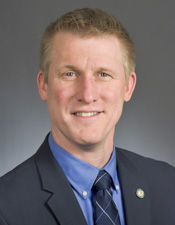Advocates call for more support for foster, adoptive families
When the Martindale family adopted a 6-year-old boy with fetal alcohol syndrome spectrum disorder and a rocky history with the foster care system, they knew it would be difficult.
They just didn’t realize how difficult. He hoarded food, fought at school, acted aggressively toward his new siblings, lied, stole, ran away and set fires, Julie Martindale said.
She had promised to stick by the boy through thick and thin, but questioned her ability to keep that commitment when his behavior spun so out of control, she feared for his safety and that of her family, she told the House Health and Human Services Reform Committee Thursday.
HF1412 would require the Human Services Department to establish a program to support adoptive, foster, and kinship families like the Martindale’s in order to reduce changes in child placement, said bill sponsor Rep. Nels Pierson (R-Rochester).
Referred to the House Health and Human Services Finance Committee, it has no Senate companion.
Services for adoptive parents in Minnesota vary between counties and agencies and significant gaps exist between programs, especially in Greater Minnesota, said Mary Boo, executive director of the North American Council on Adoptable Children.
Meanwhile, variable funding makes it difficult for parents to rely on those programs as they try to address the needs of children struggling with PTSD, anxiety, depression, anger, mental illness, learning disabilities, or brain damage caused by early exposure to drugs and alcohol.
The program that would be established by HF1412 could provide respite care, a parent-to-parent support network, service navigators, a crisis hotline, educational support, peer support and mental health services for youth and families, mental health services for families, and trauma-informed training for families and professionals who work with them.
Improved services would not only help children heal from trauma and keep families together, but also encourage adoption from foster care and make it easier to recruit and retain foster parents, Boo said.
The extent of services would be determined by how much federal funding is available, though the bill also calls for an unspecified allocation from the General Fund in Fiscal Year 2018, Pierson said.
While the Martindales recognized their adopted sons’ behavior was a response to his traumatic past, many people blamed them for his challenges. The guidance and support of other adoptive parents helped, but so much more could have been done for their son – now 20 – and other children, Martindale said.
“Through no fault of our own, they need us. They need us, as a society to help them,” she said.
Rep. Rena Moran (DFL-St. Paul) stressed that work needs to be done to prevent foster-care placement in the first place and that more resources should be available to families who have lost their children, so they can increase the chances of reunification.
Related Articles
Search Session Daily
Advanced Search OptionsPriority Dailies
Legislative leaders set 2026 committee deadlines
By Lisa Kaczke Legislative leaders on Tuesday officially set the timeline for getting bills through the committee process during the upcoming 2026 session.
Here are the three deadlines for...
Legislative leaders on Tuesday officially set the timeline for getting bills through the committee process during the upcoming 2026 session.
Here are the three deadlines for...
